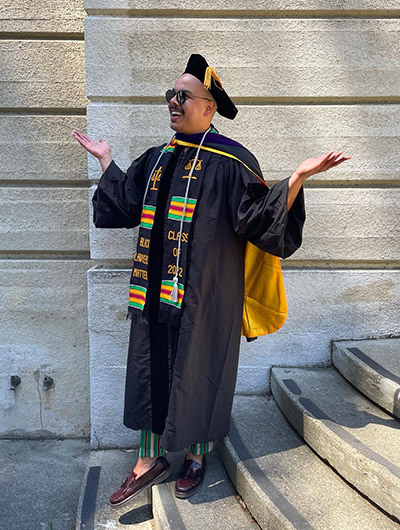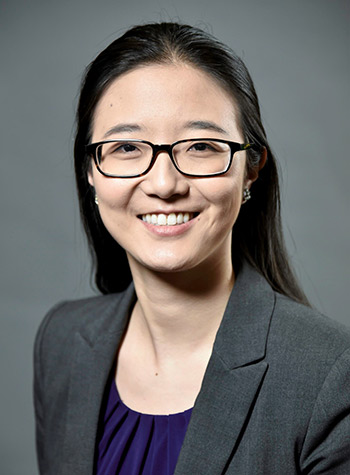
By Andrew Cohen
Before enrolling at Berkeley Law, Devin Oliver ’22 had no idea what judicial clerks did.
“I honestly thought they were more like court administrators or stenographers, which now sounds ridiculous,” he says. “I only really understood after a Berkeley Law alum explained that clerking was like ghostwriting for a judge and doing the behind-the-scenes work that directly informs the judge’s final rulings or opinions.”
Soon after, he also learned that Black people held just 4% of federal clerkships among 2019 law school graduates, while whites held 79%. This year, of Berkeley Law’s 87 clerks working across 30 states and territories, roughly a quarter are people of color and over half are women.

“We’re proud of that diversity,” says Director of Judicial Clerkships Anna Han. “Representation in the legal profession — and especially in the judiciary and among judicial staff — is critical to eliminating bias and improving access to justice.”
Oliver will soon begin a two-year federal clerkship for Chief Judge Miranda Du ’94 of the U.S. District Court for the District of Nevada. After that, he will spend a year clerking for Nevada Supreme Court Justice Lidia Stiglich.
Now a resource for other diverse or non-traditional law students pursuing clerkships, Oliver says that while many judges still use rigid hiring standards that don’t necessarily predict one’s ability to succeed as a clerk, a growing number are adopting a more holistic process.
“They’re seeing many students like me — diverse, non-traditional, and not in the top 5%, 10%, or even 20% of their class — are able to thrive,” he says. “Work experience, quality of professional relationships, public service, and lived experiences are more telling of one’s ability in that role than timed exams on an artificially forced curve. I decided to grow my legal skills through internships grounded in active litigation.”
His own path
As a law student, Oliver co-chaired the Berkeley Law Queer Caucus and the law school’s chapter of the Berkeley Energy & Resources Collaborative. He was also involved with the Name and Gender Change Workshop, Ecology Law Quarterly, and Law Students of African Descent.
Oliver came to Berkeley to become an environmental justice lawyer. But as his interests and goals evolved during his 2L year, he fell in love with litigation, particularly legal research and writing. He now wants to become an appellate attorney and eventually teach as a law professor.
“Learning to research effectively, write well, and write efficiently — all key skills developed as a judicial law clerk — would allow me to hit the ground running as a practicing attorney,” Oliver says. “What better way to learn how to litigate than seeing firsthand how the litigation ‘sausage’ is made and learning what judges consider strong advocacy?”
Oliver targeted Nevada for its unique docket, which includes many environmental, public lands, and natural resources disputes. He was also drawn to Du’s sterling reputation and that fact that former clerks he talked with enjoyed working with her.
“And on a more personal level, Chief Judge Du stood out as a powerful role model as a first-generation woman of color and Berkeley Law alum who has excelled as both a lawyer and federal judge,” he says.

Oliver praises Han, Career Development Office Deputy Director Eric Stern, and former Director of Judicial Clerkships Grayce Zelphin ’11 for demystifying the clerkship application process. He also credits Antonio Ingram ’14, his First Generation Professionals mentor, who Oliver says, “at every step helped me prepare my clerkship application and believe in my own power as a Black, queer, first-generation college graduate and first-generation lawyer.”
A worldly view
Felix Mendez-Burgos ’21, who has begun clerking for Judge Maria Cenzon on the Guam Superior Court, became interested after his friend Chris Brown ’19 raved about clerking for her.
“He’d constantly text me about how it was the most amazing experience,” Mendez-Burgos says. “It was hard to shut him up about the scuba diving he was doing on the weekends, the hike adventures, the friends he was making, and the lasting relationships he was building at the courthouse with judges and other law clerks. So when I got the opportunity to do the same thing, it was a no-brainer.”
After graduating from Berkeley Law, Mendez-Burgos entered private practice as a litigation associate in Florida and loved it.
“I started to think of persuasive writing and oral advocacy as an art form,” he says. “And I just wanted to get better. I thought the best way to perfect my craft was to try my hand at clerking. What could beat being in chambers seeing how judges think and how the courthouse operates?”
Born in Colombia and raised in Tampa, Mendez-Burgos studied abroad in Italy and the United Kingdom. After graduating from Florida State University in 2017, he refined his Spanish language skills as a program assistant in the university’s Spain study center.
That international bent continued. He spent the summer after 1L year in Tokyo as an associate at Japan’s largest law firm, served as treasurer of La Alianza at Berkeley Law, and worked in Geneva as a student legal advisor at the United Nations Human Rights Council. So as the idea of clerking gained momentum, so did the hope of adding a new location.
Taking the leap
“Guam came calling and it was perfect,” he says. “Fortunately, I’ve loved clerking and plan to do one more clerkship in the continental U.S. before settling down in Florida and growing my practice.”
Mendez-Burgos was a submissions team member of the Berkeley Business Law Journal and student advocate at the East Bay Community Law Center during law school. Working with EBCLC’s Immigration Clinic, he learned how to work in the intricate intersection of probate and immigration law and was able to help a client gain special immigrant juvenile status.
In another clinic, the New Business Community Law Clinic, Mendez-Burgos represented three entrepreneurs and their businesses on legal issues including entity formation, employment, and compliance.
Like Oliver, he credits such diverse law school experiences for fueling his clerkship confidence and describes how hands-on Berkeley Law’s Career Development Office was throughout the application process.
“When I first got the itch to try my hand at clerking, I touched base with Anna and we created an action plan. She was extremely helpful, especially when drafting cover letters,” Mendez-Burgos says. “The overall support I got was just incredible.”